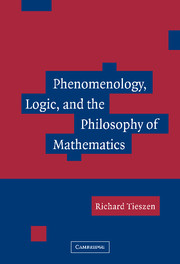Book contents
- Frontmatter
- Contents
- Acknowledgments
- Introduction: Themes and Issues
- PART I REASON, SCIENCE, AND MATHEMATICS
- PART II KURT GÖDEL, PHENOMENOLOGY, AND THE PHILOSOPHY OF MATHEMATICS
- 4 Kurt Gödel and Phenomenology
- 5 Gödel's Philosophical Remarks on Logic and Mathematics
- 6 Gödel's Path from the Incompleteness Theorems (1931) to Phenomenology (1961)
- 7 Gödel and the Intuition of Concepts
- 8 Gödel and Quine on Meaning and Mathematics
- 9 Maddy on Realism in Mathematics
- 10 Penrose on Minds and Machines
- PART III CONSTRUCTIVISM, FULFILLABLE INTENTIONS, AND ORIGINS
- Bibliography
- Index
7 - Gödel and the Intuition of Concepts
Published online by Cambridge University Press: 14 July 2009
- Frontmatter
- Contents
- Acknowledgments
- Introduction: Themes and Issues
- PART I REASON, SCIENCE, AND MATHEMATICS
- PART II KURT GÖDEL, PHENOMENOLOGY, AND THE PHILOSOPHY OF MATHEMATICS
- 4 Kurt Gödel and Phenomenology
- 5 Gödel's Philosophical Remarks on Logic and Mathematics
- 6 Gödel's Path from the Incompleteness Theorems (1931) to Phenomenology (1961)
- 7 Gödel and the Intuition of Concepts
- 8 Gödel and Quine on Meaning and Mathematics
- 9 Maddy on Realism in Mathematics
- 10 Penrose on Minds and Machines
- PART III CONSTRUCTIVISM, FULFILLABLE INTENTIONS, AND ORIGINS
- Bibliography
- Index
Summary
Gödel has argued that we can cultivate the intuition or ‘perception’ of abstract concepts in mathematics and logic (see, e.g., Gödel 1944, 1947, 1964, *1953/59, *1961/?, 1964, 1972). Gödel's ideas about the intuition of concepts are not incidental to his later philosophical thinking but are related to many other themes in his work, and especially to his reflections on the incompleteness theorems. I will describe how some of Gödel's claims about the intuition of abstract concepts are related to other themes in his philosophy of mathematics. In most of this chapter, however, I will focus on a central question that has been raised in the literature on Gödel: what kind of account could be given of the intuition of abstract concepts? I sketch an answer to this question that uses some ideas of a philosopher to whom Gödel also turned in this connection: Edmund Husserl. It is not my goal in this chapter to give a complete account of Husserl's own views on the intuition of abstract or ideal objects, and, in any case, it would not be feasible to do so. For more details about Husserl's specific views on categorial intuition and related topics see Tieszen (2004).
Gödel's comments on abstract concepts are a product of his philosophical interpretation of his incompleteness theorems. In § 1 of this chapter I present an argument, based on the incompleteness theorems, that is supposed to take us from recognition of the existence of concrete sign-configurations to recognition of the existence of abstract concepts.
- Type
- Chapter
- Information
- Phenomenology, Logic, and the Philosophy of Mathematics , pp. 149 - 176Publisher: Cambridge University PressPrint publication year: 2005



